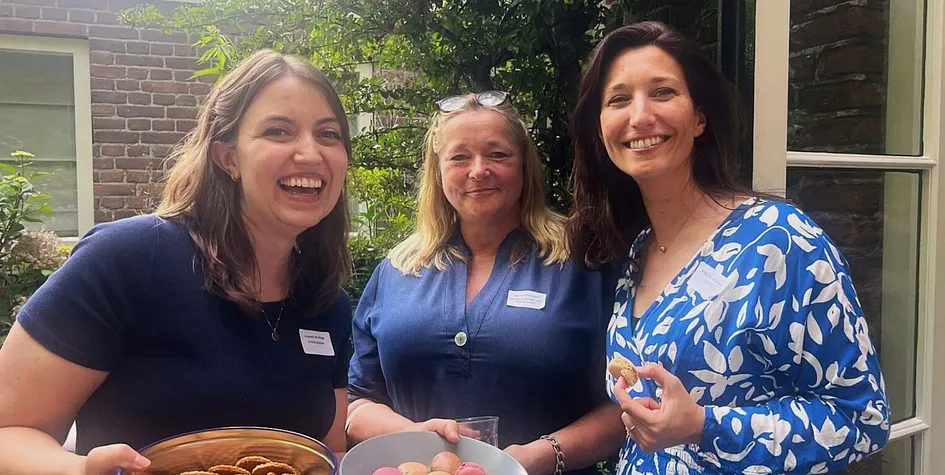Our team would be happy to share their expertise to help you get the answers you are looking for. Feel free to contact us about your situation and any questions you may have.
We look forward to hearing from you!
As part of our shared mission to support Dutch companies in the French market Undutchables and the Netherlands France Chamber of Commerce (NFCC) recently teamed up to host a networking event with the goal of supporting companies looking to do business between France and the Netherlands.
During the networking drinks participants were faced with a difficult treat choice: stroopwafels or macarons. As we laughed over the stark comparison between these delicious, but distinctly different treats, and the obvious application to the theme of the day, many people came to the same conclusion – both!
Just like the treats, the French and Dutch markets each have their own unique strengths and contrasting approaches. There is great potential for cooperation, it just takes a little effort to figure out the best way to bring it all together.
Topics such as communication, punctuality, relationship-building, and decision-making can differ widely between the two countries. During the presentations, experts from Undutchables and NFCC walked us through some of the most important points to keep in mind when expanding business between France and the Netherlands. They highlighted the abundant opportunities that come with cross-market collaboration and shared fascinating (and sometimes amusing!) differences between Dutch and French work cultures along with tips for creating successful business relationships.
One of the most lively discussions of the evening revolved around how communication styles differ between France and the Netherlands. While Dutch professionals tend to favor directness and a practical approach their French counterparts tend to value focusing on the relationship and the reasons behind the collaboration most. This can lead to some very different approaches when it comes to entering a new business relationship or tackling a group project.
Doing business in France often revolves around the story. Professionals want to know not only what you are working on, but why, what drives you, and how you got there. This is also an important piece of relationship building, and may be missed out on if individuals from other countries, such as the Netherlands, skip over the details to just get to the point. Both countries value relationship building, but, the French tend to put more time and effort into building loyalty with business partners while the Dutch sometimes skip over the get-to-know-you phase a bit in favor of practical solutions and task-oriented collaborations. This can also be true during meetings. For example, to the Dutch, French colleagues may seem distracted by small talk and not appear to get to the core until the meeting should be almost over, while Dutch colleagues may seem completely disinterested to their French team members, as they jump straight into the facts at the beginning.
Both approaches have a place in doing business, but if you try to combine a purely practical approach with a more detailed, relationship-focused approach there are bound to be some moments of confusion. Preparing ahead of time to understand these nuances can make a big difference in the success of your international collaboration .
Time perception and expectations sparked some of the biggest laughs—and nods of recognition—during the event. Punctuality, in particular, highlighted a major difference between the two countries. In Dutch business culture, being right on time (or even a few minutes early) is the norm. In contrast, French business culture tends to take a more relaxed approach to timekeeping. Meetings may begin later than scheduled, and it’s often more important to finish a conversation or establish rapport than to stick strictly to the clock.
Similarly, decision-making in France may also take more time. This is typically due to prioritizing taking the time to make a well-deliberated and properly strategical decision. This often also requires multiple levels of input and deliberation up to the highest levels of management, including a lot of paperwork, which can take some extra time as well. In the Netherlands, decision-making tends to be flatter and a bit quicker. Although this does not always mean it goes at a speedy pace, since Dutch meetings are consensus-driven and it can take some time to get everyone on the same page as well. However, the tendency to make decisions in a less risk-aversive and more deadline-oriented way can bring the focus back to “being on time” rather than “taking the time” to think it all out before taking action.
Recognizing and respecting these timelines can make collaboration between your Dutch and French teams far smoother—and save both sides from unnecessary frustration and misunderstandings.
One key takeaway from the event was the important distinction between translation and true adaptation. Simply translating marketing materials or internal communication word-for-word does not usually resonate well across borders because it is not just about the language, it is also about the culture. This is especially true for French clients and colleagues, (remember the importance of storytelling?), so if you really want to engage with your audience in France it is worth taking the time to adjust your message to make it culturally relevant.
Getting guidance from local employees can be especially valuable as you work to adapt your products and processes. These talented individuals not only speak the language of the land, they also understand the cultural nuances, so they are a great resource for helping you expand your business, while avoiding any business faux pas.
Whether you are seeking French-speakers to kickstart your business in France, Dutch speakers to cover the projects in the Netherlands, or any other combination of language and culture experience to boost your international collaboration, multilingual recruitment can help your team gain the resources they need. This requires open-minded hiring efforts and a focus on creating an inclusive company culture to make sure that you and your team can tackle the cultural differences with a smile and bridge the gap to lead to greater success across the board.
Whether it’s taking a bit more time to get to know each other in a French business meeting or outlining the goals of the project in short, dry points at the beginning for the Dutch team, being aware of the cultural nuances is essential. There are far too many cultural differences to name in one article, but luckily, there are just as many similarities. At the end of the day, the key to cross-cultural collaboration is keeping an open mind and being willing to figure it out together. As NFCC emphasized during the event, “Please don’t place the challenge of bridging differences on your customer—take responsibility yourself.” So, when in doubt, ask, listen, and be curious— et voila! You will be on your way to international success in no time!
If you are looking to expand your business in France or the Netherlands please reach out to our team and we will be happy to help you navigate the cultural nuances and find the best team members to help your company grow.
Our team would be happy to share their expertise to help you get the answers you are looking for. Feel free to contact us about your situation and any questions you may have.
We look forward to hearing from you!

We only need a few personal details, thanks!

